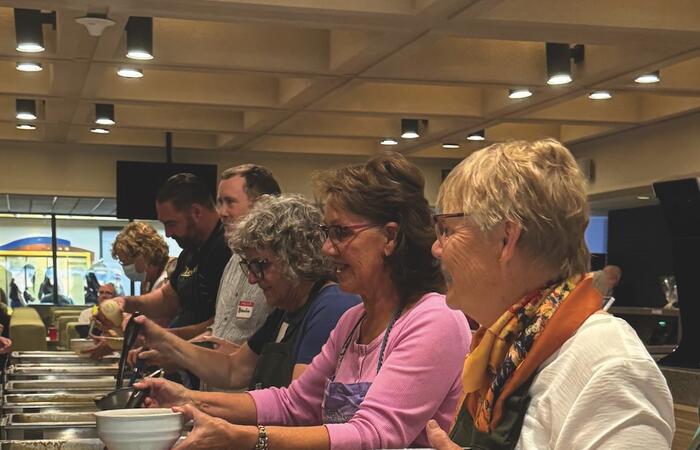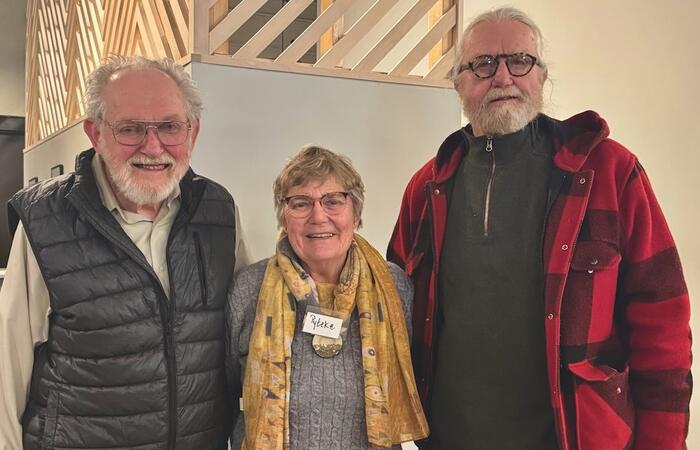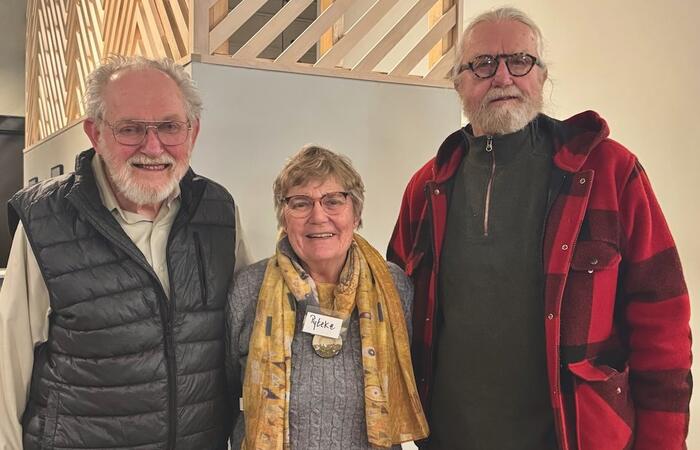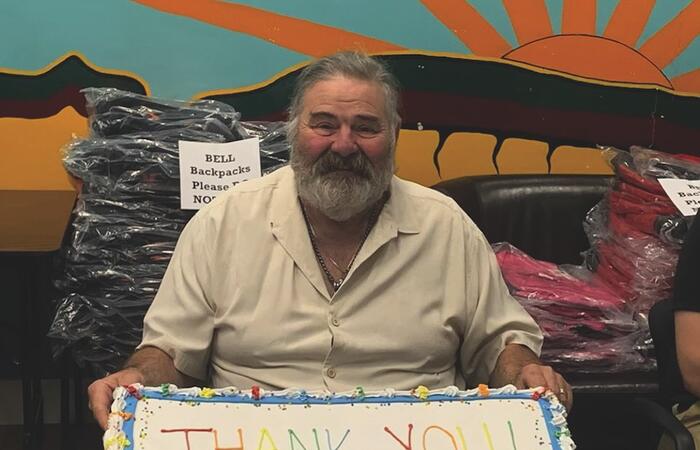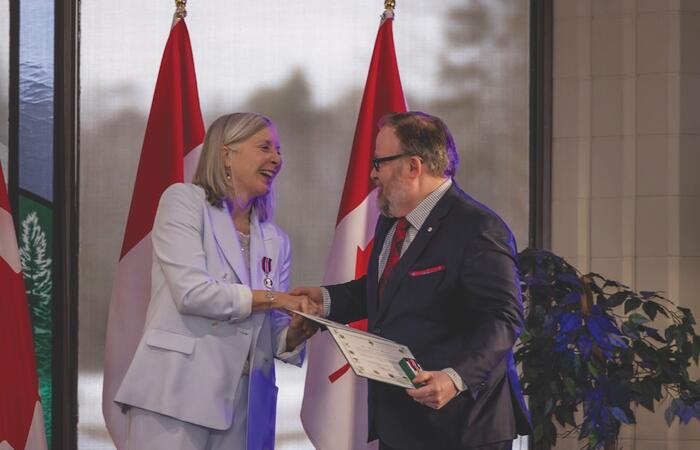If Thunder Bay has a giant heart, then our giant heart is beating because of the many dedicated volunteers who make a difference in the lives of people in our city every day.
Forty Thunder Bayers were recognized for their unselfish volunteer work at the King Charles III Coronation Medal Ceremony on March 8. “Through their dedication, they have alleviated suffering, brought joy, and strengthened the fabric of our community,” Hon. Patty Hajdu said during the ceremony. “Their influence is felt in ways both profound and quiet—through acts of kindness, leadership, and resilience.”
Bayview magazine reached out to four recipients and asked them to share their volunteer experience with our readers. Although their heroic work may differ, they each created a little sunshine that brought growth and fulfillment to both giver and receiver.
Pyteke Blaauw: Empty Bowls
Pyteke Blaauw first heard of the Empty Bowls program while visiting a church in London, Ontario. When she approached fellow potters Alan Moon and Fritz Lehmberg to discuss the possibility of starting the program in Thunder Bay, they were eager to help. Both potters had heard about a similar initiative in Michigan where a high school art teacher had students create ceramic bowls to help a local food drive in the early 1990’s.
With the support of the pottery community, Pyteke now needed a sponsor. She approached her church, the Lakehead Unitarian Fellowship, and they immediately agreed. “Since then, their involvement has been priceless,” Pyteke says, with a sincere feeling of gratitude.
Pyteke likes the simplicity of the program and is impressed with how great the impact has grown over the years. Supporters pay a modest amount of money which entitles them to choose a bowl made from a local potter.
The bowl is then filled with a delicious soup and once the meal is enjoyed, the purchaser can take the bowl home with them to serve as a reminder of the many people who do without. Since its conception, just over 25 years ago, close to half a million dollars has been shared between the Thunder Bay Food Bank and Shelter House.
Members of the Thunder Bay Potters Guild have been donating bowls since the beginning with many unassociated potters jumping in when the event grew in popularity. Each year the organizing committee approaches a diverse group of restaurants and asks for their signature soup. There’s never a shortage of donated pots of soup, bread, and desserts and sometimes the chefs themselves serve the patrons.
When the event is held in October, symbolically close to World Food Day on October 16, Pyteke loves watching the people line up outside the venue in anticipation of selecting their perfect bowl and sitting down to enjoy a steaming hot bowl of soup on a cool fall day. “We average around 400 people for this dinner,” Pyteke says with a smile. “It is a coming together of the community and joining in an activity that links art and charity.”
And why does Pyteke dedicate so many hours to this cause? The reason is simple. “I volunteer because it gives me pleasure. I like to hang out with people and work on projects. I like to be in company.”
John Trevisanutto: Our Kids Count
John Trevisanutto has long been recognized as a supporter for Our Kids Count, helping the organization financially, volunteering, and hosting many fund-raising events. Without his valuable assistance, many of the programs that promote self-esteem, peer leadership, and support would not be able to run, including the community kitchens, parenting and life skills workshops, pre/post-natal support, home visiting, emergency food cupboard, Big Brothers and Big Sisters mentoring, and counselling.
John is a firm believer in what OKC stands for: that if parents are given support, their children will succeed, no matter what socio or economic background. “I want to help people less fortunate,” he says. “I want to get involved. I want to be committed.”
Unfortunately, the lack of willingness of some to give of their time to help others is one of the challenges John and many others have when they’re volunteering. “It can be very frustrating,” John says. “We need people to sit on boards, we need people to get into the trenches, so to speak, and help.”
And why?
Because, as John says, one should volunteer for purely “selfish reasons.”
“I get more joy out of seeing other people benefit from the work that is done to help them through their journey. It simply feels good.”
John believes his biggest accomplishment has been how he and his wife have raised their children.
“They realize the importance of giving back to a community that has been so good to our family.”
And it fills in the time. As a retired business owner, John has needed to fill his day with other meaningful work.
But, as John is quick to point out, volunteering isn’t always work.
“We all, especially in our senior years, have nothing but time. And the joy it brings to others is what it’s all about.”
“Our ability to help, to make a difference in other peoples’ lives can vary, but the effect it has on others is very deep,” John says. Whether it’s a smile to a person who is having a tough day, or hours of time spent volunteering, it makes a difference. And that’s what it’s all about.
Dr. Michel S. Beaulieu: Preserver of History
Dr. Michel S. Beaulieu is Thunder Bay and Northwestern Ontario’s preserver of history. Serving on various not-for-profit organizations, charitable organizations and community groups, including the Thunder Bay Historical Museum Society, the Canadian International Council (Thunder Bay Branch), Ontario Historical Society, The Champlain Society, and the Multicultural History Society of Ontario over the last 20 years, Dr. Beaulieu has worked tirelessly to preserve the history and heritage of our region.
There is a reason for Dr. Beaulieu’s passion for bringing history to the forefront. “Our heritage doesn’t preserve itself,” he maintains. “Historical narratives, community artifacts, oral histories, and cultural landmarks are fragile and often at risk of being forgotten or overlooked. Without dedicated time and attention, these valuable pieces of our collective identity can fade.”
For this reason, Dr. Beaulieu has written and published over a dozen books, more than three dozen book chapters and articles, as well as contributed to various films and exhibits to ensure that history is preserved and accessible to the public. All of this involves meticulous research and documentation of significant events, cultural milestones, and notable individuals from our area, covering topics such as labour, politics, film, women’s roles and contributions, Indigenous, and resource development history.
\When asked what memorable moments have made all his volunteer work worthwhile, Dr. Beaulieu admits his trip to Holland with the representing soldiers from the LSSR for the 75th anniversary of the liberation of Holland as one of his top picks. Getting his son, Leo, his museum membership card, and ensuring the next generation follows in his footsteps, is, by far, number one.
Dr. Beaulieu is very proud of the work that organizations like the Thunder Bay Historical Museum Society have done to make history more accessible. He is grateful that he was able to play a small role in making documents and images, oral histories, and the vast amount of what has been written on Ontario’s history, accessible to future generations. He stresses, however, that it goes beyond that. “It’s about giving voices from the past a platform today. That impact will last long after my time there, and that’s what makes it truly meaningful.”
The benefits of Dr. Beaulieu’s work are far reaching. “These efforts ensure that the wisdom, struggles, and achievements of the past continue to inspire and educate future generations,” he maintains. “You don’t need to be a historian to make a difference, just someone who cares about where we’ve come from, and where we’re going as a society.”
Sean Spenrath: First Nation Student Success and Wake the Giant
A lot of people know Wake the Giant for the big moments, the orientation in the fall and the music festival that brings everyone together, but what many don’t see is everything that happens in between. To King Charles III Coronation Medal recipient, Sean Spenrath, Wake the Giant is so much more than a weekend event. It’s a year-round effort to create opportunities, open doors, and make sure Indigenous youth feel supported every step of the way while they’re in the city.
Throughout the school year, Sean and his fellow volunteers are working behind the scenes, building partnerships, organizing learning experiences, connecting youth with the community, and making sure they have places where they feel safe and welcomed. When Sean and fellow volunteers, Greg Chomut and Angus Haapa, each received the King Charles III Coronation Medal, it meant a lot to them because it reflected the ongoing work, not just the highlights. Like Sean says, “It’s about people coming together all year to make sure these students feel seen, respected, and celebrated.”
Sean admits that one of the biggest challenges they face every year is trying to break even. Wake the Giant has grown into something very special, but putting on events of this scale, especially with the goal of keeping them accessible and meaningful for everyone, comes with a lot of financial pressure. The group is not in it for profit, but to create an impact, so every dollar goes right back into supporting youth and building community.
“It’s a constant balance of trying to do more, reach more people, and offer more support, while making sure we can cover the costs,” Sean says. “We rely heavily on the generosity of our partners, sponsors, and the community, and we’re always looking for new ways to keep the momentum going without compromising what Wake the Giant stands for. It’s not easy, but the purpose behind the work keeps the Wake the Giant team going.”
When asked about the moments that stand out, Sean has many that come to memory and make all the work worthwhile. In Wake the Giant’s first year, a group of students got up on stage and performed with July Talk. “It was one of those unforgettable moments where you could just feel how proud they were,” Sean says with a smile. Debra Thomas, one of their students, performed live with DJ Shub and completely lit up the stage, and when the jingle dress dancers performed with X Ambassadors, it gave everyone goosebumps.
“Seeing traditional culture and mainstream music come together like that was something really special,” Sean adds.
It’s also the quieter, everyday wins that mean just as much. Some of Sean’s students have landed paid internships with CBC, which, Sean admits with a certain amount of satisfaction, “is huge.” “The students are gaining experience, building confidence, and being taken seriously in professional spaces.” When another student, Harmony Fiddler, a young Indigenous artist, saw her artwork featured on a billboard in Thunder Bay, Sean was extremely proud. “That moment, seeing her art up there for the whole city to appreciate, was incredibly powerful.”
More recently, Home Depot has provided the school with money to build a smoking teepee. This is something that will benefit Dennis Franklin Cromarty High School students for the next twenty years as it will provide a place where they can smoke meats and tan hides.
Sean emphasizes that his volunteer work is not just about the music festival or the orientation. It’s about the relationships being built, the confidence these young people are finding, and the way the community is starting to shift. It’s about showing these young people that they matter, that their culture matters, and that they truly belong in Thunder Bay. “That’s what makes everything we do feel worth it,” Sean maintains. “When a student tells us they feel proud of who they are, or a business says they’ve learned something and are trying to do better, that’s when we know the work is making a difference.”

